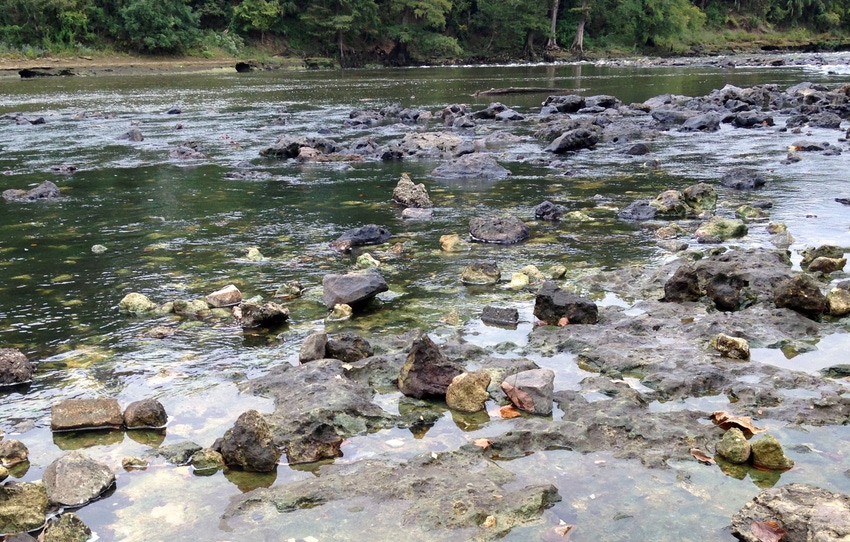
In a key decision in the water dispute between Georgia and Florida, a court-appointed special master's conclusion favored Georgia.
The Water Wars between Alabama, Georgia and Florida have gone on since the early 1990s and center around water capacity and usage in the Apalachicola-Chattahoochee-Flint River Basin. Over the years, political leaders failed to resolve the various skirmishes in the dispute. In 2013, Florida sued Georgia in the U.S. Supreme Court. Alabama is not a plaintiff in this case.
In a Dec. 11 filing to the court, Special Master Paul J. Kelly, Jr., a U.S. Circuit Judge in Santa Fe concluded:
"Florida’s claim it will suffer if Georgia’s water consumption isn’t curtailed upstream of the basin. I do not recommend that the Supreme Court grant Florida’s request for a decree equitably apportioning the waters of the ACF Basin because the evidence has not shown harm to Florida caused by Georgia; the evidence has shown that Georgia’s water use is reasonable; and the evidence has not shown that the benefits of apportionment would substantially outweigh the potential harms."
Kelly's decision was well received by Georgia agricultural interests, especially in southwest Georgia's diverse ag landscape, where growers worry the decades-old dispute may result in agricultural water restrictions.
"Special Master Kelly's recommendation, if adopted by the Supreme Court, would bring tremendous relief to farmers whose livelihoods depend on agriculture and water. Producers in south Georgia have been extremely proactive in the implementation of water-efficient practices. It was very encouraging for the special master to acknowledge these conservation efforts and Georgia's reasonable use of our shared water resources," Casey Cox, who farms with her father in Camilla, Ga., told Southeast Farm Press Dec. 16.
Cox is the former executive director of the Flint River Soil and Water Conservation District in southwest Georgia.
The new executive director of the district, Perri Campis, told Farm Press that Kelly's recommendation "reinforces what we know to be true here on the ground in southwest Georgia-- farmers are implementing cutting edge technologies in their operations to ensure only necessary and efficient water use.
"Georgia's agricultural economy is dependent on our natural resources, so it is in everyone's best interest that we continue to be stewards of water and all of our natural resources that make our state so special. The district is committed to continuing to work closely with our partners and with local landowners to develop and implement conservation technologies and practices here in southwest Georgia and across the Southeast," Campis said.
“I am elated by this ruling, which is a major victory for Georgia. As we move forward, I hope we can come to an equitable resolution for all states involved as soon as possible," said U.S. Congressmn Sanford Bishop, who's district includes much of southwest Georgia.
As expected, not all were pleased with Kelly's recommendation to the Supreme Court.
"Today’s ruling is a major disappointment for fair, responsible water usage on which both states depend. Geogia’s unchecked disruption of our shared waters in the Apalachicola River has devastated Florida’s oyster industry. I’m encouraging our state agencies to continue fighting to hold Georgia accountable for its water use, and to explore all legal options," said Nikki Fried, Florida Agriculture Commissioner
This latest ruling, known officially as Florida vs. Georgia, is not the end of this long dispute; just another chapter in it. The Supreme Court must once again consider the special master's conclusion, which the court could accept, deny or call for more arguments or for Kelly, or another special master, to investigate further.
According to the U.S. Geological Service, the ACF basin provides water to nearly 4 million people and is the significant water source for Metro Atlanta and other cities downstream. USGS data shows the rivers and tributaries supplied irrigation water for 736,000 acres in the basin in 2010. The basin is also the source of freshwater for aquatic ecosystems in rivers and for the Apalachicola Bay in Florida, which is the principal argument of Florida's case against Georgia.
Florida, according to language in the case, contends Georgia is consuming more than its equitable share of Flint River specifically, adding that if Georgia consumed less water from the Flint, more water would flow into Lake Seminole and pass down the Apalachicola River and into Apalachicola Bay.
The additional water that would result from a cap on Georgia’s consumption would, Florida argues, help (among other things) to recover and maintain its oyster industry, which collapsed following a drought in 2012.
Georgia believes it should not have to cut back on its Flint River water consumption because, in its view, it consumes no more than its equitable share
In February 2017, then special master for the case Ralph Lancaster, Jr., gave Georgia victory in the case, concluding, "Florida has failed to show that a consumption cap will afford adequate relief. … Because Florida has not met its burden, I recommend that the Court deny Florida’s request for relief.”
Florida appealed Lancaster's conclusion, and in June 2018, the court said Lancaster's recommendation was too strict against Florida and sent the case back to the special master. Kelly, soon after, was court appointed to become the next special master for the case.
Other cases related to the tri-state water dispute are also pending in the federal system.
About the Author(s)
You May Also Like






